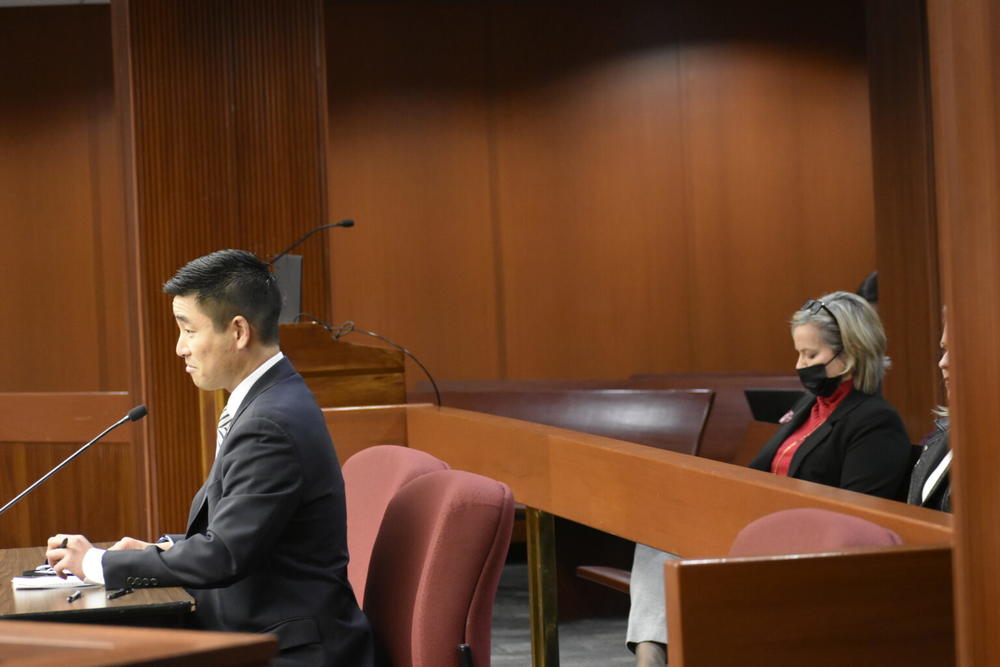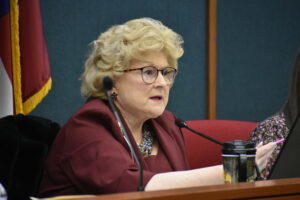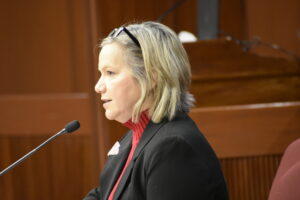
Caption
Rep. Sam Park and Rep. Bonnie Rich were on opposite sides of a dispute over their county’s election maps Tuesday.
Credit: Ross Williams/Georgia Recorder

Rep. Sam Park and Rep. Bonnie Rich were on opposite sides of a dispute over their county’s election maps Tuesday.
The drama of last year’s special redistricting session played out writ small Tuesday morning as the Republican-led House Governmental Affairs Committee passed a redrawn map for Gwinnett County’s Board of Commissioners despite objections from the Democratic majority of the county’s legislative caucus and the commissioners themselves, who are all Democrats.
The map was drawn by Suwanee Republican Rep. Bonnie Rich, chair of the House majority caucus and of the House redistricting committee. Unlike a proposal from Buford Republican Sen. Clint Dixon pitched last year, it would not increase the number of commission seats, leaving the county with four district commissioners and a chair elected countywide. Instead, it would create a Republican-friendly district in north Gwinnett, a conservative bastion represented by Rich in the metro Atlanta county that has recently shifted to favor Democrats.
The map proposed by the commission, on the other hand, divides that portion of the county into parts of three districts, which Rich said dilutes residents’ ability to elect a commissioner who reflects their values.
Committee members could not name another case in which the Legislature overrode a local commission’s proposed map. Some Democrats worry what was once a rarity could become commonplace this session. Last month, Republican House members from the Athens area submitted a plan to redraw the Athens-Clarke County lines approved by the left-leaning commission there.
Smyrna state Rep. Erick Allen, a Democrat who is running for lieutenant governor, said the same game is afoot in Cobb County.
“We’re in the same boat,” he said. “We’ve got our own issues. We’ve had members of the minority party, Republicans, the minority in Cobb, introduce both school board and Cobb commission maps that don’t meet our delegation rules. We’re trying to follow that to find out what the Speaker is going to do with our bills.”
Allen said it does not seem like a coincidence that these moves are happening in Atlanta suburbs that shifted Democratic and in Athens, a liberal college town.
“This is what happens when people start to see their power diminish,” he said. “They revert to doing things like this, which is blatantly reject the will of the voters in Cobb County. The Cobb County voters are the ones who said we want a majority Democratic commission. The voters of Cobb County are the ones who said we want a majority Democratic delegation. The minority is just going around the duly elected members of each body to get what they want because they can.”
Allen said he expects the Cobb maps to be moved from the Intergovernmental Coordination Committee, which handles local legislation, to the Governmental Affairs Committee, allowing them to be passed without the approval of the majority-Democratic Cobb delegation, similar to what happened with Gwinnett.
Gwinnett Commission Chair Nickole Hendrickson said the Democratic Gwinnett map incorporated public input from open houses throughout the county and made minimal changes from the last map, which was created when Republicans dominated the commission.

Gwinnett Commission Chair Nickole Hendrickson and state Rep. Sam Park.
“The map reflected both the input of the public and demographic diversity of our county,” she said. “This is the process that we support, a local map adopted by locals with input from locals. From the very beginning we have affirmed our commitment to a fair process, which ultimately would result in a fair map. While we understand the General Assembly is ultimately responsible for passing local redistricting maps, we cannot support a map that did not have local input from all sides of our county and was not passed by the Gwinnett local delegation.”
Lawrenceville Democratic Rep. Sam Park, who sponsored the map approved by the commissioners, said he was not able to see the revised map until Monday, when Rich announced it through a press release.
“This is not a compromise, this is a unilateral effort by Rep. Rich to draw the district maps in Gwinnett County based on race,” he said. “To my understanding, the unprecedented actions taken by Rep. Rich not only violated House rule 18.2, this deviation from the regular process for local redistricting demonstrates racially discriminatory intent in violation of Section Two of the Voting Rights Act of 1965.”
“Rep. Rich is forcing Gwinnett County down the path toward unnecessary litigation if this committee moves forward with a substitute that carries what appears to be a racially gerrymandered map, a map drawn based on race,” he added.
Those remarks were out of line, said committee chair state Rep. Darlene Taylor, a Republican from Thomasville.
“You’ve made that comment several times, and I find it offensive,” Taylor said. “Let the information come out. Your conduct is not becoming at this time, so I would ask you to please correct the things that you’re saying. You’re making accusations. You don’t know someone’s intent. So, if you’d like to go forward, we will, but please watch what you’re saying.”

Rep. Darlene Taylor.
Park apologized for causing offense and said he was trying to point out that there is legal precedent that a government deviating from the regular redistricting process can be a factor in determining racially discriminatory intent.
Atlanta Democratic state Rep. Bee Nguyen, who is also a candidate for secretary of state, questioned the fairness of the process.
“The map that allowed five Democratic commissioners to be voted in duly by the people, those maps were not drawn by Democrats, were they?” she asked.
“No, it is my understanding that they were drawn by Republicans who were here a decade before me,” Rich said.
“And isn’t it true that Gwinnett County, for over 30 years, they had no Democrats on the commission, period, isn’t that true?” Nguyen asked.
“I don’t know that for a fact, but that would not surprise me,” Rich said.
“And so I guess, if we have five commissioners who have been elected by the people, and we’ve got a majority of your delegation members who support Rep. Park’s proposed map, and we have no public hearings on what you’re proposing, it does seem like this isn’t the most democratic process,” Nguyen said.
“Redistricting happens for a reason,” Rich said. “There are population changes and population shifts. In order to be constitutional, we have to redistrict, and that is what we’re doing. And the lines that are drawn on this map that you see before you on the easel reflect the population changes and the population shifts that are appropriate now.”
Rich said she has been in regular contact with the board and its lobbyists about the map since December, but her words fell on deaf ears. She said the committee held no public hearings on the map in the northern part of the county, which illustrates the problem her map intends to solve.
“My constituents, the ones who vote for me, come to me, and they tell me they have no voice and no seat at the table at the county level,” she said. “A glance at the map that we are currently operating under and the plot of the addresses for the county commissioners tells the entire story. Every single one of our five county commissioners, including our chairwoman, live in the southern part of our county. The northern part of the county, my constituents, have no voice at the table. This has been reiterated over and over again. Unfortunately, the Board of Commissioners chose to 100% ignore my input.”

Rep. Bonnie Rich.
Rich also bristled at suggestions that she made the map with racist intent, pointing out that none of its districts are majority white.
The northern district on Rich’s map is 48% white, 18% Black, 16% Hispanic and 14% Asian, Rich said. Gwinnett County’s population in 2021 was 35.4% white non-Hispanic, according to census numbers.
“This is something that has become personal as well,” Rich said. “My name has been mentioned multiple times by another representative and by a member of the public, names have been called, allegations have been made, the words ‘white power’ have been used. There’s no evidence of that. They’re just slinging and hurling slurs at me personally. I live in my community. I’ve lived there for a long time. I have a business there. I have raised my children there. It’s still my children’s home. And these things are being said about me in the media with zero factual basis.”
“The maps that I’ve proposed, that allow all of our communities of interest to have a voice, those four districts that you see behind you, not a single one of them is majority white, including the northern part, where I live and where I represent my neighbors and my friends,” she added. “Because you see, conservatism does not depend on the color of one’s skin.”
If Rich’s map is to become official, its next stop will be the full House, where Republican lawmakers have voted to allow residents to vote on creating their own cities in two Republican areas of the county, which has also trended Democratic in recent elections, East Cobb and Lost Mountain in west Cobb. The House also approved a similar bill in south Cobb’s Vinings, which trends more Democratic. A bill to create a new city out of Atlanta’s posh Buckhead district is in limbo after Lt. Gov. Geoff Duncan assigned it to a committee dominated by Democrats opposed to the split.
This story comes to GPB through a reporting partnership with Georgia Recorder.